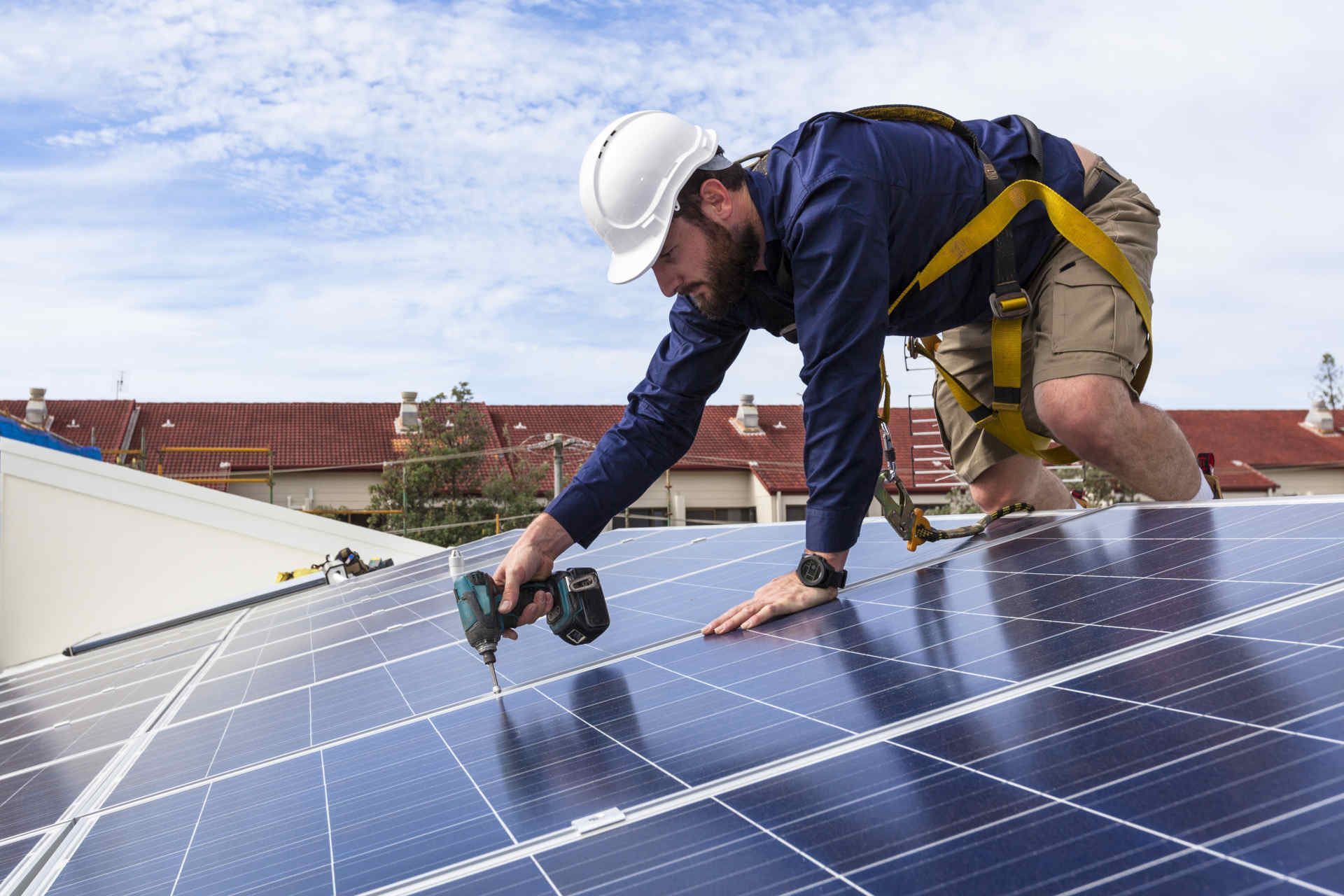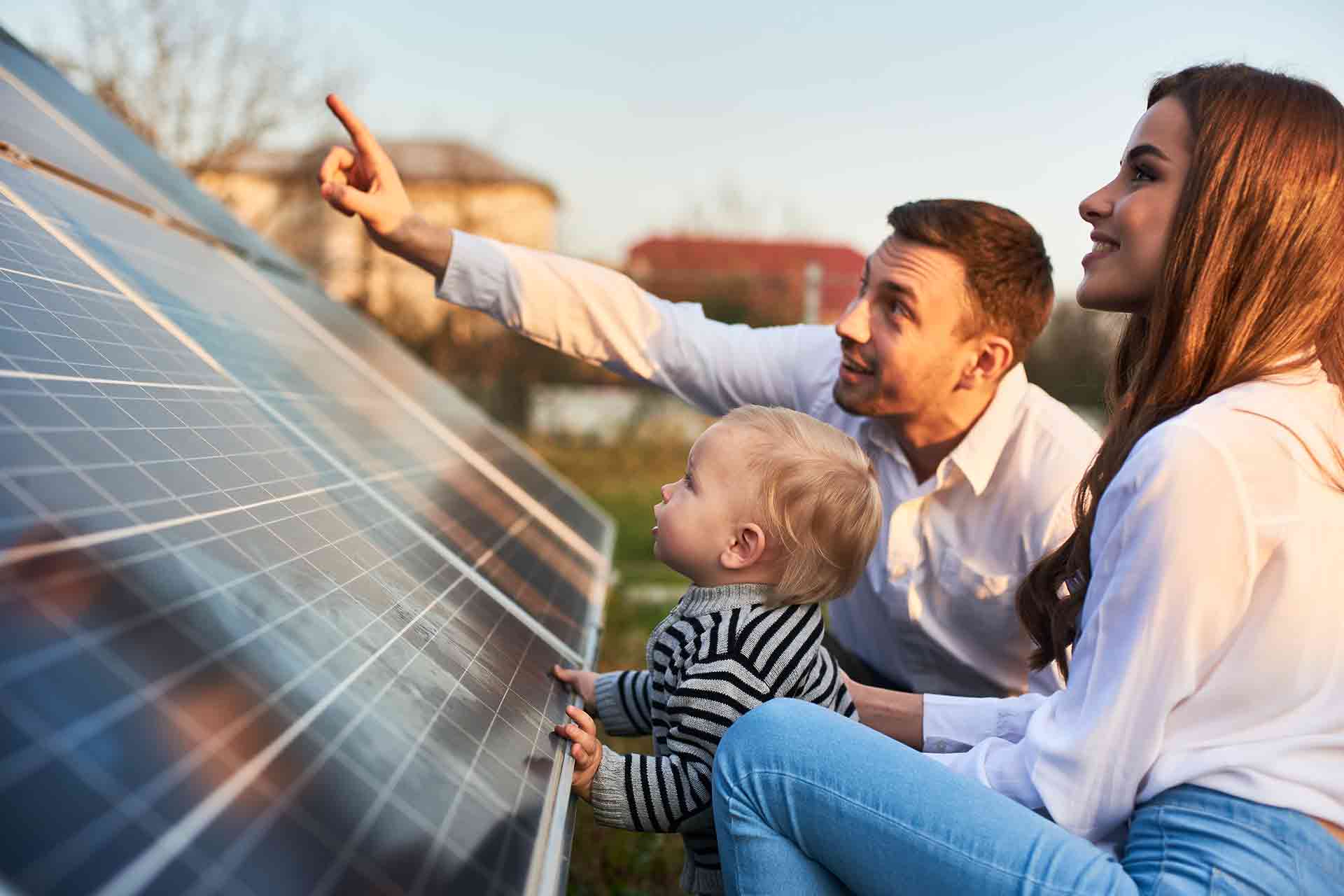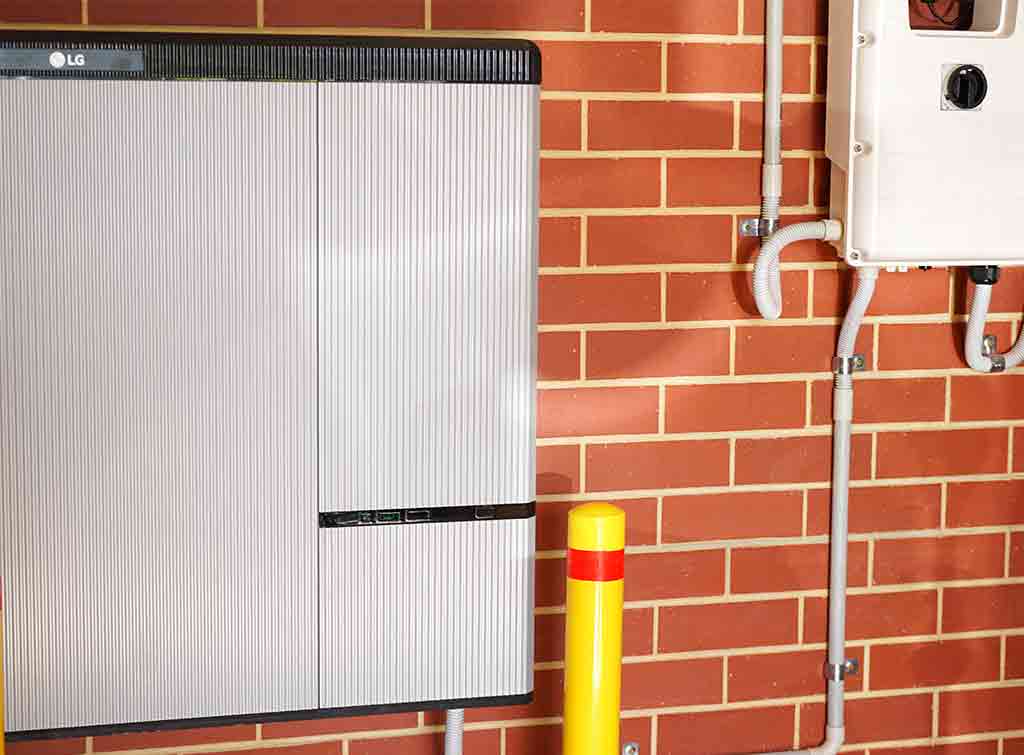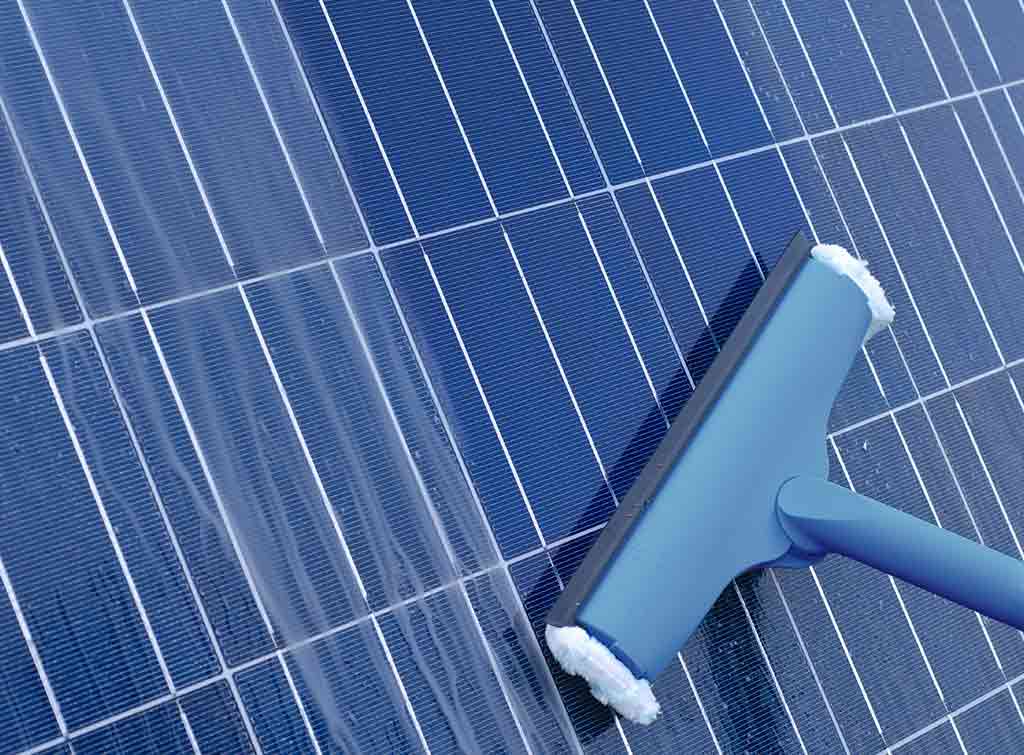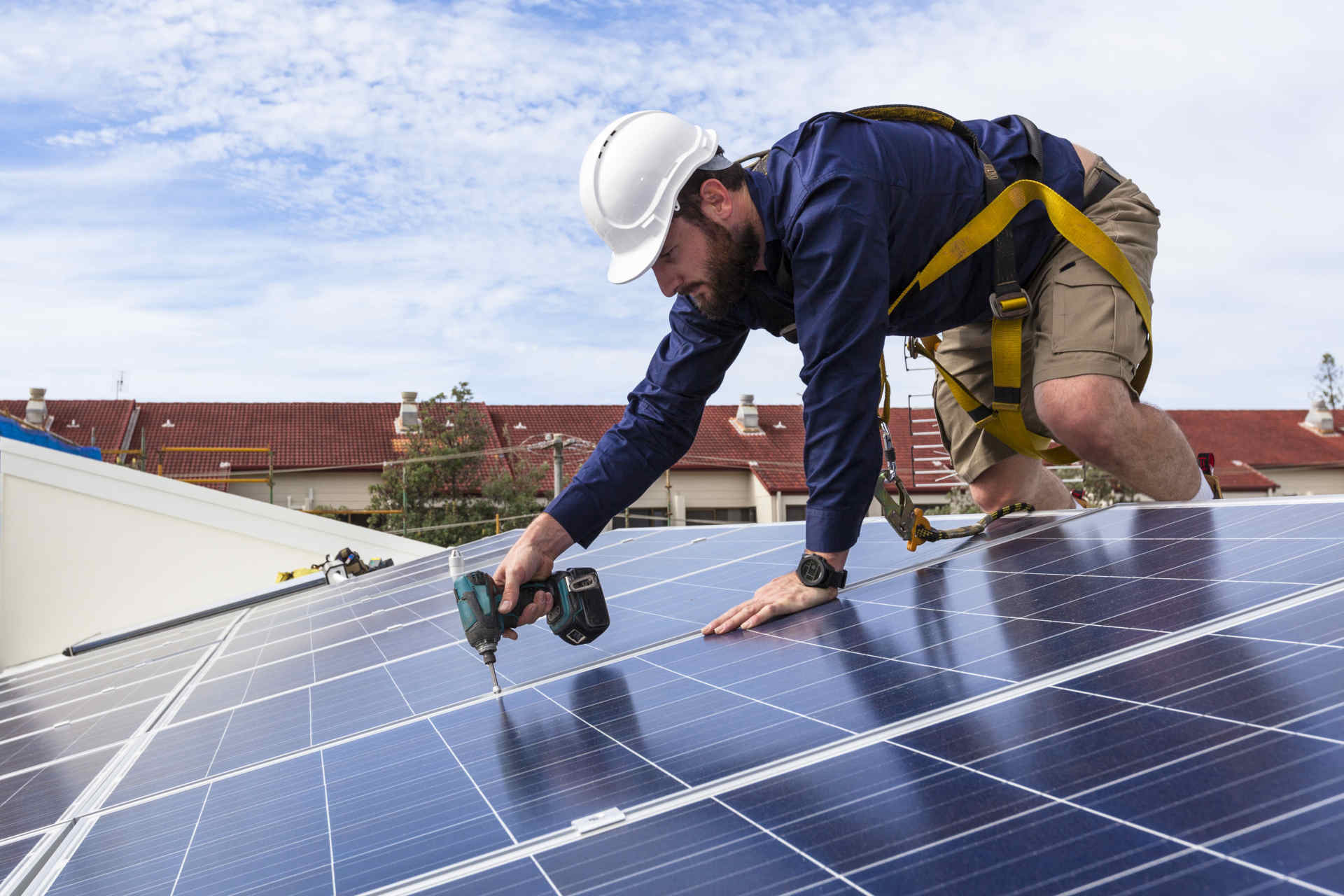Blog>Expert Advice>Your essential guide to flat roof solar panels
Last updated: 19 December 2024
Your essential guide to flat roof solar panels
Looking to transform the wasted space of your flat roof with solar panels and reduce your energy bills? Read on for everything you need to know about flat roof solar panel installation in the UK.
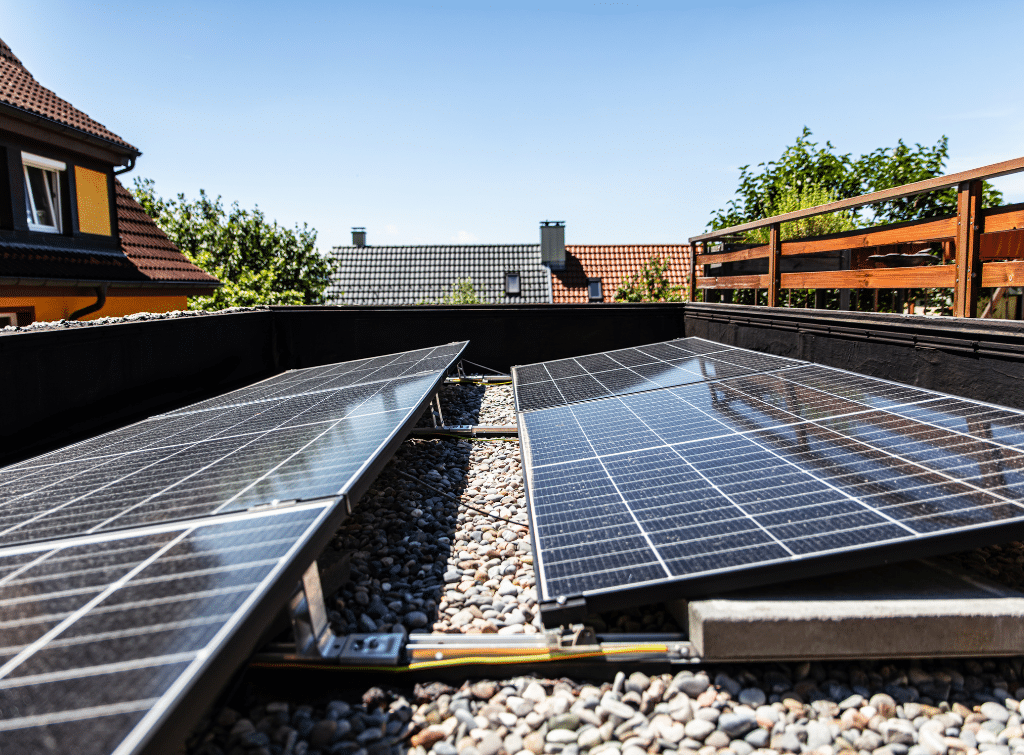
With energy costs rising, it’s no wonder solar panels are becoming increasingly popular. Add to that the various government grants now available, and solar panel installation is more affordable than ever.
However, some homeowners are still surprised to hear that solar panels are just as effective when mounted on flat roofs as on pitched roofs. But a professional installation is key.
Here, we run you through all the vital information you need about a flat roof solar panel installation, along with the pros and cons. We also share advice on finding an experienced solar panel installer using our free search directory below.
See the tradespeople we've checked and recommend for your job
What are flat roof solar panels?
One of the first things to know about flat roof solar panels (also known as photovoltaic (PV) system panels) is that they are identical, regardless of whether you’re installing them on a flat roof or pitched roof.
But here’s the difference – flat roof solar panels require a specialist mounting system to catch the best of the sunlight.
Adjustable mounting frames are:
Pitched between 20-50 degrees, allowing you to change the angle of your solar panels throughout the year. For instance, during the summer, you’ll want to angle your panels lower as the sun rises higher
If you’d rather not have to adjust them, a 35-degree angle is considered the most efficient
The slight pitch of the solar panels also helps rainwater slide away rather than pooling beneath the panels
Two different mounting systems are available depending on your roof type. They include:
Ballasted systems – Weights hold the panels in place without penetrating the roof – ideal for flat roofs that cannot be punctured due to waterproofing concerns
Penetrating systems – The panels are secured to the roof with bolts or screws – this requires careful planning to avoid leaks and potential roof damage
A specialist solar panel installer will advise on what mounting system is best for your flat roof as part of a home survey.
Other important factors they’ll be looking out for
To make sure your flat roof is suitable for a solar panel installation, a specialist will also be checking the following:
Space
You’ll need ample space for solar panels to ensure access around the panels for maintenance and to avoid shading. Generally speaking, we’re talking at least 20 square metres.
Roof orientation
South-facing flat roofs are best. Meanwhile, east and west-facing panels produce roughly 15% less electricity. Making sure there’s no shade from neighbouring buildings is also important, as this will impact how much energy your solar panels produce.
Roof strength
Ensuring your flat roof can support the weight of multiple solar panels and mounting systems is vital. If it’s an older building, you might need additional reinforcement to support the weight. In this case, a structural engineer may be needed to check the strength of your flat roof first.
Flat roof solar panels pros and cons
If you’re deciding whether to invest in solar panels for your flat roof, you’ll want to know all the advantages and disadvantages to make an informed decision.
After all, installing solar panels is one of the costliest home improvements you can make (more on the costs later). But for now, let’s run through the pros and cons:
Pros:
The biggest benefit of any solar panel installation is, of course, the cost savings. When professionally installed, you could save between per year.
But there are also many pros to installing solar panels, specifically on a flat roof. They include:
Flexibility – Flat roof solar panels can be tilted for optimal sunlight exposure. This is in contrast to pitched roof solar panels, which tend to be stationary
Easier access – As flat roofs tend to lower than pitched roofs, maintenance and cleaning are easier to keep on top of
Larger installs – Flat roofs tend to offer more available space, so there’s the potential for larger installations – and larger savings on your energy bills!
Quicker setup – Generally speaking, solar panel installation is quicker than roof installation as access is easier, and there’s no need for scaffolding
Appearance – Harder to see from the ground compared to pitched roof solar panels, so less of an eyesore
Cons:
Potential drainage issues – Flat roofs are prone to water pooling. You’ll need to ensure the drainage on your flat roof is tip-top before the installation begins
Additional mounting – This is necessary to achieve the optimal angles, but it will cost more
Roof strength – Solar panels and the mounting system are hefty bits of kit. Often, steel frameworks and gravel-filled ballasts are used. You’ll need to ensure you know your flat roof's weight limit
Space – Flat roof solar panels need lots of space so they don’t cast shade on each other. Also, you need to account for access for cleaning and maintenance
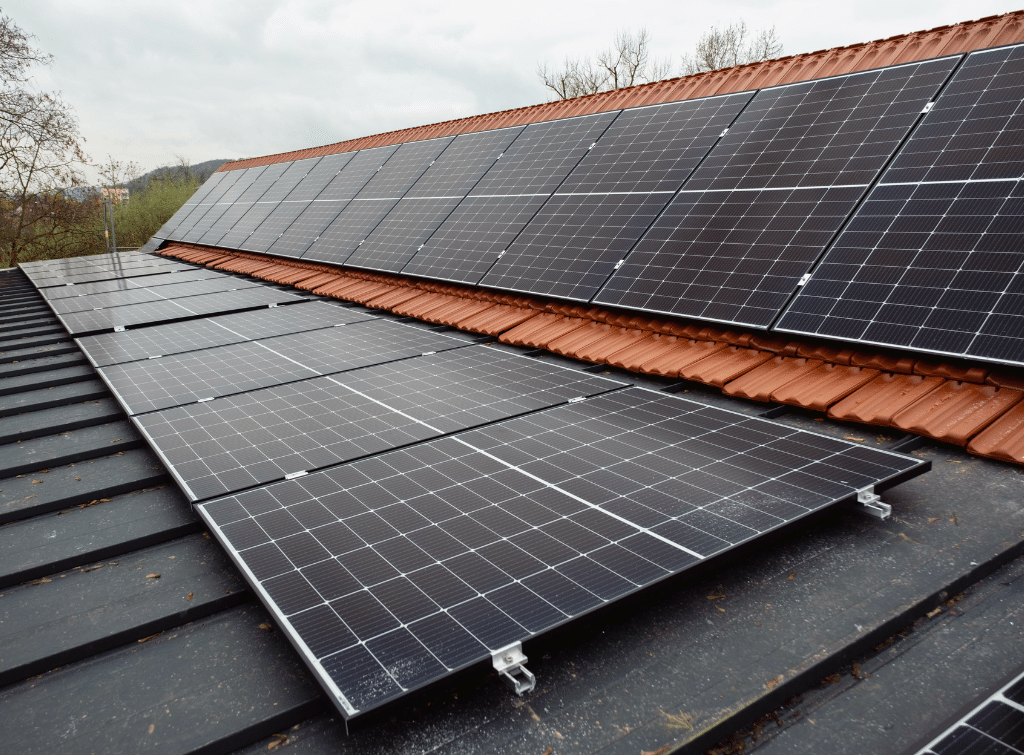
Why flat roof solar panel installation isn't a DIY job
While there’s technically nothing stopping you from installing flat roof solar panels, we wouldn’t recommend it unless you’re highly experienced and a qualified electrician.
There are countless elements to consider when installing a solar panel system, including:
Roof suitability
Not all flat roofs are suitable for solar panel installations. For instance, if the orientation is wrong or the roof isn’t strong enough to bear the weight of the solar panels and mounting equipment. These are all things an experienced solar panel installer can advise on.
Specialist installation
Flat roof installations require specialist mounting systems to position panels at the optimal angle to maximise sunlight exposure. A solar panel expert will know the exact orientation this needs to be. But left in inexperienced hands, the solar panels could be installed incorrectly, and all that money buying expensive solar panels will go to waste!
Complex electrical setup
Connecting the panels to your home's electrical system involves complex wiring to ensure safety standards. Faulty installations can lead to serious safety issues and could be a fire risk.
Warranty
The solar panels must be installed strictly according to the manufacturer’s instructions. If you lay them too flat, rainwater could damage them or make them less effective. This will void your warranty.
Certification
A DIY job means you also won’t get a sign-off from the Microgeneration Certification Scheme (MCS). While this certification isn’t necessary for a flat roof solar panel installation in the UK, it is strongly recommended. Here’s why:
The MCS is a government-backed quality assurance scheme that makes sure your installation meets rigorous efficiency and safety standards
It allows you to sell surplus electricity to the grid. Our comprehensive solar panel installation cost guide has more information about that
Given the complexities, we always recommend hiring a qualified solar panel installer. But with so many companies now offering solar panel installations, how do you decide who to contact? That’s up next.
Finding reputable solar panel installers
Installing solar panels on a flat roof is a specialist job, so getting a recommendation for an experienced installer from friends and family might be tricky. But that’s where we can help.
Just search for a specialist by following these three simple steps:
Use a professional directory
Save time by using a professional directory (like Checkatrade!).
We're so confident in the quality of the trades on Checkatrade that if you book through us, we guarantee their work up to £1,000. Guaranteed for 12 months – Eligibility criteria and T&Cs apply.
Contact or pay a trade through Checkatrade and you’re covered by our 12-month guarantee of up to £1,000*

Read online reviews
A review from a previous customer is one of the best ways to check a tradesperson's professionalism.
At Checkatrade, we check all online reviews to ensure they're from real people and that trades meet our high standards.

We check the reviews on Checkatrade are from real people, and that trades meet our high standards.
Compare quotes
Get at least three quotes from experienced solar panel installers local to you. That way, you can be sure you're getting the best tradesperson and price for the job. Search your postcode to get started.
See the tradespeople we've checked and recommend for your job
How much does solar panel installation cost?
Generally speaking, a flat roof solar panel installation may cost slightly more than a pitched roof installation.
This is because:
Specialist mounting systems are essential
Repairs to your flat roof drainage systems might be required
A structural engineer may be needed to check the strength of your flat roof
If additional reinforcement is needed to your flat roof to support the weight, this will be an extra cost
However, here are some approximate costs to give you a general steer:
A 4kw solar panel system, suitable for a 2-3 bedroom house, typically costs around Semi-detached
A 6kW system, more suited to a larger, 4+ bedroom house, typically costs around Large detached
Don’t forget to factor in your ongoing maintenance costs. Solar panel cleaning costs can be around £15 per panel
While this is all a significant investment, don’t be tempted to save on costs by purchasing a smaller system. Solar panel systems with higher kW can generate more electricity – and the more electricity you have on your flat roof, the more effective they will be.
Top tip – Look into the UK government grant incentives to save some money. There are also flexible payment plans available, meaning you don’t need to fork out on the whole installation cost in one go.
You can learn more about installation costs in our comprehensive cost guide, which includes an interactive cost calculator.
Ready to find an experienced solar panel specialist and get that free electricity flowing? Book with Checkatrade to ensure a professional and efficient setup.
See the tradespeople we've checked and recommend for your job
Frequently asked questions
Can solar panels be installed on a flat roof in the UK?
Absolutely. Solar panels can be installed on flat roofs in the UK using mounting systems that help angle the panels to capture the best of the sun.
Do flat roof solar panels generate as much energy as those on pitched roofs?
Flat roof solar panels are as efficient as those on pitched roofs as long as they are professionally installed to ensure proper angling and orientation.
What are the advantages of installing solar panels on a flat roof?
As explored above, there are many benefits, including flexibility of orientation and ease of access for maintenance. They are generally quicker to install, and there’s no need for scaffolding.
What challenges are associated with flat roof solar panel installations?
Water pooling is a problem if you don’t have efficient drainage or solar panels aren’t tilted correctly. If a structural engineer reports that your flat roof isn’t strong enough, you might have to install additional roof reinforcements, which could slow the process down slightly.
Is it advisable to install flat roof solar panels as a DIY project?
We always recommend hiring experienced professionals to install flat roof solar panels. This is a specialist and complex job involving electricity. If your solar panels are positioned incorrectly, they won’t generate enough energy. They also won't be covered by a manufacturer's warranty.
What is the optimal angle for solar panels on a flat roof in the UK?
Many solar panel specialists say the optimal angle is typically 35 degrees. However, the exact optimal position of your solar panels will depend on your roof’s orientation and the time of year.
Are there additional costs associated with installing solar panels on a flat roof compared to a pitched roof?
Yes, mounting systems are needed to angle the panels correctly on a flat roof, so you’ll need to factor in this additional cost.
What maintenance is required for flat roof solar panels?
Solar panels tend to be self-cleaning, and the tilted angle helps to clear away rainwater. However, occasional cleaning to remove any debris and check over the panels is a good idea. And thankfully, accessing a flat roof is a lot easier than a pitched roof!
Do you need planning permission for flat roof solar panels?
In most cases, no. However, it’s best to contact your local authorities to check. This is especially important if you live in a conservation area.
How do I find a reputable tradesperson for flat roof solar panel installation in the UK?
Use reputable online directories (like Checkatrade!) to connect with vetted and reviewed solar panel installers in your area.
See the tradespeople we've checked and recommend for your job
More Expert Advice Articles
More Solar Panel Installation Articles
See the tradespeople we've checked and recommend for your job

